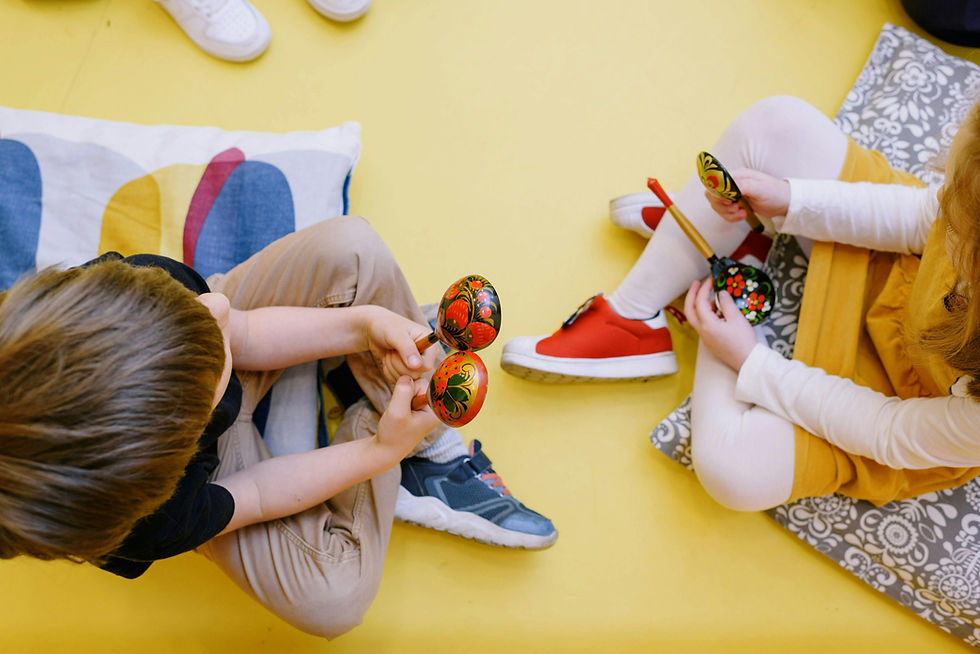Music as a Language: How Learning Music Translates Into Life Skills
- Brittany Bennett
- Sep 29
- 3 min read

When most people think about music lessons, they picture students learning scales, memorizing pieces, and preparing for recitals. But music is so much more than a technical skill. It’s a language—one that, once learned, opens doors to creativity, resilience, and real-world growth.
Music Builds the Brain Like Learning a New Language
Musicians often describe music as a second language, and research supports this comparison. Playing music engages both hemispheres of the brain and stimulates the same areas responsible for language processing, memory, and pattern recognition.
Learning to read music is like decoding a new alphabet. Notes, rhythms, dynamics, and articulations must be interpreted and translated into motion and sound. Over time, this process becomes intuitive—just like reading a book. And just like language, the earlier a child begins learning music, the easier it is to absorb and apply.
This kind of mental exercise sharpens auditory discrimination, visual processing, and sequencing—all foundational skills that support academic achievement. Music strengthens the mental ‘muscles’ that help students retain new information, detect subtle differences in sounds, and process complex patterns.
Problem-Solving and Critical Thinking
Music training teaches more than just melodies. It helps students analyze problems, set goals, and try different solutions when something doesn’t work. Playing a difficult passage wrong? You figure out what went wrong, try it again, and learn from the process.
This iterative learning loop teaches patience, perseverance, and strategic thinking. These are the same traits that help students tackle math problems, write essays, or plan science experiments. Music helps kids become more comfortable with challenges and more confident in their ability to overcome them.
Creativity in Action
Music is one of the few disciplines where structure and creativity exist side-by-side. Students learn rules—about rhythm, harmony, and technique—but are also encouraged to explore within those rules. Whether they’re writing their own songs or adding expression to a familiar piece, they are learning to think creatively within a framework.
This balance of discipline and imagination is rare and valuable. In today’s world, employers seek out individuals who can innovate within boundaries. Artists, engineers, designers, and entrepreneurs all rely on creative problem-solving. Music teaches these skills early—and in a way that feels fun and fulfilling.
Resilience and Growth Mindset
Every musician, no matter how experienced, has had to deal with missed notes, shaky performances, or slow progress. Music teaches students how to manage frustration, bounce back from setbacks, and keep moving forward.
This builds what psychologists call a “growth mindset”—the belief that abilities can improve with effort. Students start to see mistakes not as failures, but as part of learning. This mindset has been linked to better mental health, higher academic achievement, and greater long-term success.
Connection and Communication
While music is deeply personal, it’s also a shared experience. Through group classes, ensemble playing, and even informal jam sessions, students learn how to collaborate and communicate. They learn when to lead and when to follow. They learn how to express ideas without words.
These social-emotional skills are essential in every area of life. At NoteWise, we’ve seen students grow not only as musicians, but as communicators, teammates, and friends. The connections formed through music often last far beyond the classroom.
Final Thoughts
At NoteWise Music Academy, we teach more than music. We teach students how to think creatively, collaborate meaningfully, and persevere through challenges. We believe music is a powerful language that shapes the way we understand the world—and ourselves.
Whether your child dreams of performing on stage or simply wants to try something new, music education offers tools that will serve them for a lifetime. Let’s help them speak this powerful language fluently.





Comments